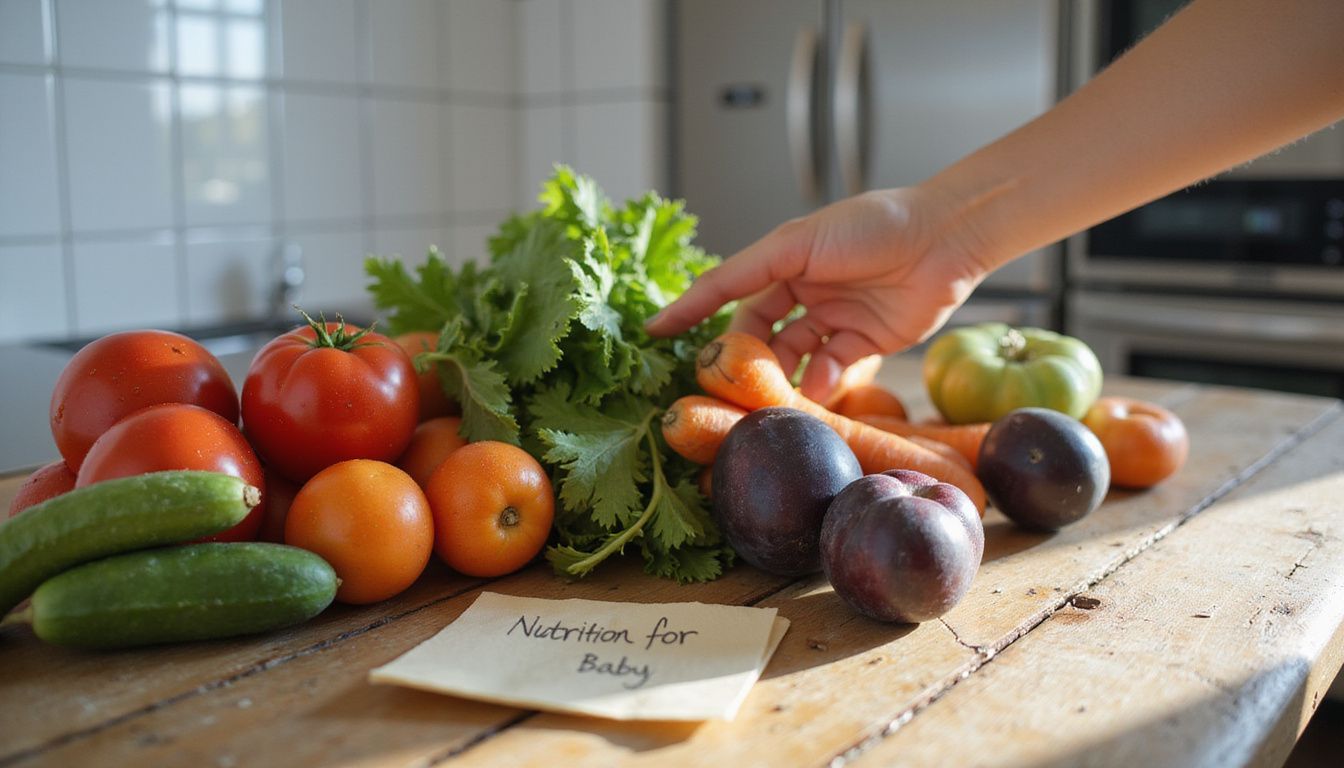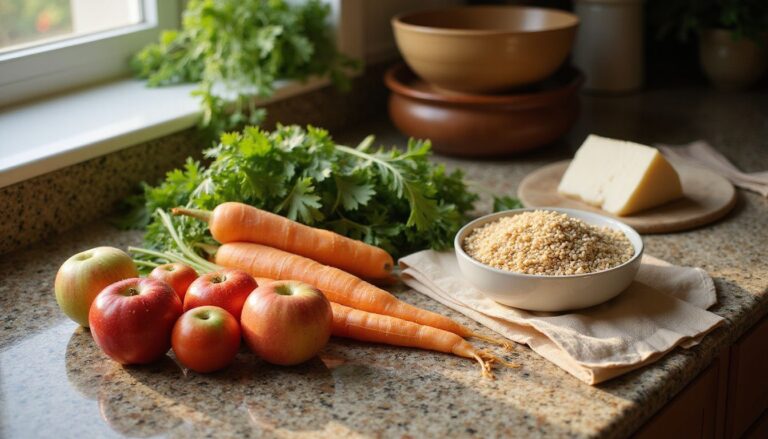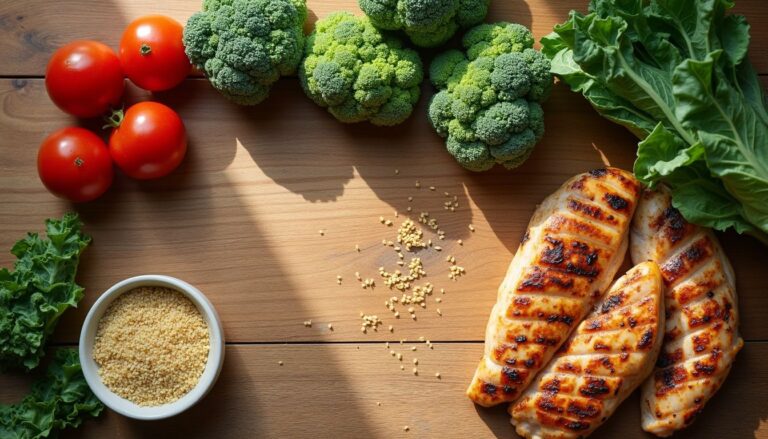Essential Nutrients For Pregnancy: Nutrition During Pregnancy Explained
Our Nutrition Assistant AI Suite will transform your body. You will lose fat, get toned, and build muscle. Gain confidence and optimal health.
Sorting through food advice can feel overwhelming in pregnancy. Clear, simple guidance on nutrition during pregnancy helps you care for yourself and your growing baby with confidence. Getting enough folic acid before and during early pregnancy lowers the risk of neural tube defects.
This guide explains the essential nutrients you need, foods to enjoy and foods to avoid, and how smart choices support a healthy pregnancy. Keep reading for practical steps to build a balanced diet that fits real life.
Key Takeaways
- Take 400 micrograms of folic acid daily before conception and through early pregnancy to help prevent neural tube defects (CDC, USDA).
- Aim for 1,000 mg calcium and about 71 grams of protein per day to support fetal growth and protect your bones.
- Eat 8 to 12 ounces each week of low-mercury fish for omega-3 fats, especially DHA and EPA (ACOG).
- Avoid high-mercury fish, alcohol, unpasteurized dairy, and processed meats to reduce infection and birth defect risks.
- Discuss any prenatal supplement or major diet change with your healthcare professional first.

Why Is Nutrition Important During Pregnancy?

Food is your body’s building material during pregnancy. A healthy diet provides the vitamins and minerals your body needs to stay strong, and it fuels prenatal development.
How Does Nutrition Affect Maternal Health?
Good nutrition supports steady energy, healthy weight gain, and a lower risk of gestational diabetes and high blood pressure. Iron, calcium, folate, and vitamin D work together to keep bones strong, support immunity, and reduce the chance of anemia.
A daily prenatal vitamin can help fill gaps when your meals fall short. Meeting your nutrient needs also supports recovery after birth and can help with breastfeeding. Choose a mix of whole grains, lean meat or poultry, fruits, vegetables, milk, yogurt, nuts, beans, seeds, soy milk, or fortified orange juice.
How Does Nutrition Support Fetal Development?
Your baby builds organs, bones, and the brain from the nutrients you eat. Folate, iron, calcium, choline, and omega-3 fats help protect the brain and spinal cord from birth defects.
Folic acid is especially crucial. Taking 400 micrograms per day before and during early pregnancy lowers the risk of neural tube defects, as recommended by national guidelines (USDA, Institute of Medicine). Protein builds tissues and organs, calcium strengthens bones and teeth, and iron supports oxygen delivery. Vitamin D aids bone growth, and DHA from fish like salmon nourishes the developing brain.
“Your baby’s foundation for life begins with every bite you take.”
Essential Nutrients for a Healthy Pregnancy
Meeting your nutritional needs supports a healthy pregnancy and baby. The nutrients below play key roles in your health and your infant’s growth.
What Are Folate and Folic Acid?
Folate is a B vitamin found in leafy greens, beans, peas, and oranges. Folic acid is the supplemental form used in vitamins and fortified foods like cereal and rice. Folate helps your body make DNA and new cells, which is vital in pregnancy and breastfeeding.
Healthcare professionals recommend a prenatal supplement with at least 400 micrograms of folic acid daily, starting at least three months before pregnancy. This lowers the risk of defects of the brain and spinal cord. I started a prenatal vitamin with folic acid before trying to conceive, which gave me peace of mind from the start.
Why Is Calcium Important During Pregnancy?
Calcium builds your baby’s bones, teeth, heart, and muscles. Aim for about 1,000 milligrams each day. If your intake is low, your body may pull calcium from your bones to meet your baby’s needs, which can weaken your bones over time.
Dairy foods like milk, yogurt, and cheese, plus fortified soy milk and leafy greens, are strong sources. Adequate calcium is linked to a lower risk of high blood pressure and preeclampsia. Vitamin D helps your body absorb calcium effectively.
How Does Vitamin D Benefit Pregnancy?
Vitamin D helps your body absorb calcium and supports healthy bones and teeth for both you and your baby. Low levels may raise the risk of preeclampsia, gestational diabetes, and low birth weight.
The Dietary Guidelines for Americans suggest 600 IU daily. You can get vitamin D from safe sun exposure, fortified milk and cereal, eggs, or a prenatal supplement if advised by your clinician. Meeting your needs also supports immune function and cell growth.
Why Do Pregnant Women Need Iron?
Iron helps build hemoglobin, the protein in red blood cells that carries oxygen. During pregnancy, blood volume increases sharply, so iron needs go up. The recommended intake is 27 milligrams per day.
Low iron can cause fatigue and anemia, and it may raise the risk of premature birth or low birth weight. Eat iron-rich foods like beef, lentils, spinach, beans, and fortified cereals. Pair plant iron with vitamin C foods, such as oranges or strawberries, to improve absorption. If diet is not enough, your provider may suggest an iron supplement.
How Much Protein Is Needed During Pregnancy?
You need extra protein to support your baby’s growth and your body’s changes. Experts recommend about 71 grams daily, which is higher than for nonpregnant adults.
Choose a variety of protein sources, such as lean meats, beans and peas, eggs, nuts, soybeans, safe seafood, and dairy. For example, eat eggs at breakfast, add beans to lunch, snack on nuts, and serve lean chicken, tofu, or fish at dinner.
What Are Omega-3 Fatty Acids and Their Role?
Omega-3 fatty acids are healthy fats that support brain and eye development. DHA and EPA, found in fish like salmon and sardines, are especially helpful.
ACOG suggests 8 to 12 ounces of low-mercury seafood each week. My midwife encouraged salmon twice a week, which helped me meet omega-3 goals. Omega-3s may also lower the risk of preterm birth. If you consider supplements, talk with your healthcare professional first, especially with seafood allergies.
Why Is Choline Important for Pregnancy?
Choline supports brain and spinal cord development and helps form healthy cell membranes and nerve signaling. Aim for at least 450 milligrams per day.
Eggs, lean meats, fish, dairy, and some nuts provide choline. Many prenatal vitamins contain little or no choline, so check labels and ask your clinician if you need more. Adequate choline may support healthy cognition in childhood.
What Does Magnesium Do During Pregnancy?
Magnesium supports more than 300 enzyme reactions that control muscles and nerves, including heartbeat. In pregnancy, it supports growth and helps build strong bones and teeth.
Meeting your needs, about 350 to 400 mg daily, may lower the risk of preeclampsia and reduce leg cramps. Get magnesium from leafy greens, nuts, seeds, oats, beans, and whole grains. I had nighttime leg cramps until my doctor suggested more nuts and seeds; the change helped within a week.
Why Is Potassium Necessary for Pregnant Women?
Potassium supports healthy blood pressure and fluid balance. It also helps muscles, including the heart, contract normally. Many pregnant adults need around 2,900 milligrams per day, though needs vary by age.
Food sources include bananas, oranges, tomatoes, leafy greens, potatoes, dairy, and whole grains. Clients who add more fruits and vegetables often report fewer leg cramps. Potassium may also help reduce swelling as fluid needs rise in pregnancy.
Benefits of Meeting Nutritional Needs
Meeting your nutrient goals supports healthier outcomes for both you and your baby. Think of nutrition as laying solid bricks for growth, one meal at a time.
How Does Proper Nutrition Reduce Birth Defects?
A healthy diet lowers the risk of certain birth defects. Getting enough folate or folic acid before and during early pregnancy helps prevent neural tube defects such as spina bifida. The CDC recommends at least 400 micrograms of folic acid daily starting one month before conception and through the first trimester.
B vitamins, iron, and choline support the brain and spinal cord. Calcium and vitamin D help build bones and may reduce risks like cleft palate. Avoid raw fish and unpasteurized dairy to lower the chance of harmful infections. I set a morning phone alarm for my prenatal vitamin so my baby got what she needed every day.
Key Points:
- Folate lowers risks of neural tube defects.
- Iron and B vitamins support nerve development.
- Calcium and vitamin D support bones and teeth.
- Leafy vegetables add protective nutrients and fiber.
- Safe food handling protects you and your baby.
How Does Nutrition Enhance Brain and Spinal Cord Development?
Folate and choline are critical in the first weeks of pregnancy, sometimes before you know you are pregnant. They help close the neural tube, which becomes the brain and spinal cord. Aim for at least 400 micrograms of folic acid daily from fortified foods or a prenatal vitamin.
Omega-3 fats, especially DHA, help build the structure of the brain and eyes. Magnesium and iron support healthy blood flow, which delivers oxygen to growing tissues. I included salmon twice per week and focused on folate-rich foods, and I felt more confident about development.
How Does Nutrition Improve Maternal Energy Levels?
Balanced meals help keep energy steady. Whole grains like oatmeal and brown rice give slow, lasting fuel. Leafy greens, nuts, and dairy provide vitamins and minerals that turn food into energy.
Proteins such as eggs, lean meats, and legumes help repair tissues and keep you full. Iron-rich foods, including fortified cereals and spinach, support oxygen delivery and reduce fatigue. Drinking water supports digestion and prevents dehydration. Small, balanced meals usually beat sugary snacks for energy.
What Are the Best Foods to Eat During Pregnancy?
Choose nutrient-dense foods that deliver vitamins, minerals, fiber, and protein. Your plate can do a lot of good work with a few smart swaps.
Why Are Leafy Greens Beneficial?
Spinach, kale, and Swiss chard are packed with folate, which helps prevent defects in the brain and spine. Pregnant people often need about 600 micrograms of folate daily from food and supplements combined.
Leafy greens also supply vitamin K, calcium, magnesium, iron, and fiber. Fiber helps reduce constipation. Their antioxidants, such as lutein and beta carotene, support eye development and cell protection. They are low in calories and high in nutrition, so they fit easily into meals.
How Do Dairy Products Support Pregnancy Nutrition?
Dairy products provide calcium, protein, and vitamin D, which help build strong bones and teeth. One cup of milk has about 300 mg of calcium. Many pregnant adults need about 1,000 mg per day.
Choose pasteurized milk, yogurt, and cheese to avoid harmful bacteria. Fortified milk adds vitamin D to improve calcium absorption. Yogurt with live cultures may also support digestion.
What Role Do Whole Grains Play in Pregnancy?
Whole grains provide steady energy and support healthy digestion. Brown rice, oatmeal, whole wheat bread, and quinoa break down slowly and help prevent blood sugar spikes.
They are rich in fiber, iron, B vitamins such as folate, and magnesium. Aim for at least three servings daily. Swapping white rice for brown rice often helps you feel full longer.
Why Choose Lean Proteins During Pregnancy?
Lean proteins help you meet higher protein needs without too much saturated fat. Options include chicken breast, turkey, eggs, fish like cod and tilapia, beans, tofu, and lower fat dairy.
These foods support growth of muscles and tissues. ACOG recommends about 71 grams of protein per day during pregnancy. Grilled salmon, roasted chickpeas, or scrambled eggs with spinach can keep you full and energized.
How Are Nuts and Seeds Helpful?
Nuts and seeds deliver protein, healthy fats, fiber, vitamins, and minerals. Almonds provide calcium and magnesium. Walnuts offer omega-3 fats for the developing brain.
Chia and flaxseeds supply plant omega-3s. Pumpkin seeds provide iron and sunflower seeds add vitamin E. A small handful makes a satisfying snack and supports steady energy.
Why Is Fatty Fish Recommended?
Fatty fish like salmon, sardines, and trout provide DHA and EPA, key omega-3 fats for brain and eye development. ACOG suggests two to three servings, 8 to 12 ounces per week, of low-mercury fish.
Choose fish with lower mercury levels and avoid species that are high in mercury. I found grilled salmon with lemon simple to prepare and a reliable source of protein and vitamin D.
What Foods Should Be Avoided During Pregnancy?
Some foods carry higher risks due to toxins or germs. Choosing safer options protects both you and your baby.
Why Avoid High-Mercury Fish?
High-mercury fish can harm your baby’s developing brain and nervous system. Avoid shark, swordfish, king mackerel, and tilefish.
Mercury passes through the placenta. Even small amounts can affect attention, memory, or language later in life. Pick low-mercury fish like salmon or sardines instead, and follow weekly limits.
What Are the Risks of Alcohol During Pregnancy?
Alcohol crosses the placenta and reaches your baby’s bloodstream. Even small amounts can disrupt development, especially in the first trimester when organs form.
Alcohol exposure can lead to fetal alcohol spectrum disorders, which include birth defects and learning or behavior challenges. Experts advise avoiding alcohol completely in pregnancy. Sparkling water with citrus makes a social swap that still feels special.
Why Skip Unpasteurized Dairy Products?
Unpasteurized milk and some soft cheeses can carry harmful bacteria like Listeria, Salmonella, and E. coli. Pregnancy changes the immune system and raises infection risk.
Infections from unpasteurized dairy can lead to miscarriage, premature birth, or severe illness in newborns. Choose only pasteurized milk, yogurt, and cheese. I once ate homemade soft cheese at a picnic and my doctor urged more caution afterward; the warning stuck with me.
Why Avoid Processed Meats?
Processed meats such as deli meat, bacon, sausage, and hot dogs may carry Listeria or Salmonella. They can also be high in sodium and saturated fat.
If you choose deli meat, heat it to steaming hot to reduce risk. Better yet, pick safer protein options like cooked poultry, eggs, beans, or fish within recommended guidelines.
How Can You Handle Food Safely During Pregnancy?
Safe food handling reduces your risk of illness. A few simple habits make a big difference at home.
How Should Fruits and Vegetables Be Washed?
Rinse produce under running water before eating or cooking. Use a clean brush on thick-skinned items like potatoes and oranges to remove dirt and microbes.
Peel and rinse outer leaves of lettuce and cabbage. Dry produce with a clean cloth or paper towel to remove more surface germs. Do not use soap or bleach. Soak strawberries in cold water briefly, then rinse well under running water.
How to Prevent Cross-Contamination?
Wash hands after handling raw meat, eggs, or unwashed produce. Use separate cutting boards and utensils for raw meats and ready-to-eat foods.
Clean counters with hot, soapy water before preparing other items. Store raw meat below ready-to-eat foods in the fridge to prevent drips. Do not reuse plates or brushes that touched raw proteins.
What Are Safe Cooking Temperatures for Meats?
Use a food thermometer to check doneness. Cook beef, pork, veal, and lamb steaks or chops to 145°F and let rest three minutes. Cook ground meats to 160°F. Cook poultry to at least 165°F.
Cook seafood to 145°F or until it flakes with a fork. During pregnancy, I relied on a digital thermometer because guessing can leave foods undercooked.
What Is the Role of Prenatal Supplements?
Diet comes first, yet prenatal supplements can help you meet needs that are hard to reach with food alone. Ask your healthcare professional which products best fit you.
How to Choose the Right Prenatal Vitamins?
Check labels for at least 400 micrograms of folic acid and 27 milligrams of iron. Look for calcium and vitamin D for bones and teeth. Some prenatals include DHA for brain development.
Do not exceed recommended doses since too much vitamin A can be harmful. If you have allergies, read ingredient lists closely. Talk with your clinician before starting any new supplement.
Why Consult Healthcare Professionals About Supplements?
Every pregnancy is unique. Your clinician can review your health history, diet, and lab results, then tailor nutrient goals for each trimester.
Some supplements interact with medicines or are unsafe at high doses. Many providers check iron and vitamin D levels with blood tests. Share all medicines, caffeine intake, and herbal products so your plan stays safe and effective.
How Should Caloric and Fluid Intake Be Managed?
Energy and fluid needs change over the months of pregnancy. A few small shifts can support steady growth.
How Many Additional Calories Are Needed Each Trimester?
In the first trimester, most people do not need extra calories. Add about 340 extra calories per day in the second trimester and about 450 extra calories per day in the third.
Choose nutrient-dense snacks like yogurt, eggs, fruit, or nuts instead of sugary treats. These extra calories support your baby’s growth and your energy. Ask your healthcare professional for guidance if your weight before pregnancy or current needs are unusual.
Why Is Staying Hydrated Important?
Fluids carry nutrients to your baby and support healthy blood volume. Many pregnant adults need about ten cups of fluids daily from water, milk, or 100 percent fruit juice.
Too little fluid can cause headaches, constipation, and may raise the risk of preterm contractions. Keep a water bottle nearby and sip often, especially during exercise or hot weather. I had fewer leg cramps after I increased my water intake and set reminders to drink.
How Can You Plan Healthy Meals During Pregnancy?
Meal planning helps you meet nutrient goals even on busy days. A little prep sets you up for success.
How to Include Variety from All Food Groups?
Fill your plate with foods from all five groups each day: fruits, vegetables, grains, protein foods, and dairy. Rotate colors and types to cover more nutrients, such as spinach, sweet potatoes, berries, and peppers. Include whole grains like brown rice, whole wheat bread, or oatmeal.
For protein, choose lean meats, eggs, beans, tofu, or fish. Pick low-fat milk, cheese, or yogurt for calcium. After I added more variety, my meals felt more satisfying and my energy stayed steadier.
What Are Tips for Preparing Balanced Meals in Advance?
Plan a simple weekly menu that covers breakfast, lunch, dinner, and snacks. Wash and cut vegetables in advance, and cook larger batches of whole grains like brown rice or oats for quick meals.
Store foods in airtight containers with dates. Build each meal with protein, complex carbohydrates, and colorful produce. Keep quick options visible, such as yogurt cups, nuts, washed fruit, and hard-boiled eggs.
What Are Common Nutrition Myths During Pregnancy?
Myths can distract from what matters. A few facts can keep your plan on track.
Why Is “Eating for Two” a Myth?
Your body becomes more efficient at absorbing nutrients. You need a modest calorie increase, not double the food. Aim for about 340 extra calories in the second trimester and about 450 in the third.
Focus on nutrient-dense foods instead of volume. Quality matters more than quantity. Leafy greens, whole grains, lean proteins, and dairy support growth without unnecessary weight gain.
What Are the Guidelines for Seafood Consumption?
Eat 8 to 12 ounces of low-mercury fish weekly, such as salmon, sardines, tilapia, cod, or shrimp. Avoid shark, swordfish, king mackerel, and tilefish because of high mercury levels.
Cook seafood thoroughly. Skip raw sushi and refrigerated smoked seafood unless heated until steaming hot. If you enjoy canned light tuna, limit to 12 ounces per week. Albacore tuna should not exceed 6 ounces weekly.
Conclusion
Thoughtful nutrition during pregnancy supports your health today and your baby’s growth for years to come. A balanced diet, smart seafood choices, and a well-chosen prenatal vitamin can help lower birth defect risks, strengthen development, and keep your energy steady.
Fill your week with leafy greens, whole grains, lean proteins, dairy, and healthy fats. If questions come up, ask your healthcare professional. Small steps taken now build a strong foundation for a healthy pregnancy and a strong start for your child.
FAQs
1. What are the most important nutrients for pregnancy?
Folic acid, iron, calcium, vitamin D, protein, and omega-3 fatty acids are vital for a healthy pregnancy. These nutrients support the growth of the fetus and help prevent birth defects. According to the Centers for Disease Control and Prevention, folic acid reduces the risk of neural tube defects by up to 70 percent.
2. How much iron does a pregnant person need each day?
Pregnant individuals need about 27 milligrams of iron daily. Iron helps make extra blood for the baby and prevents anemia. The American College of Obstetricians and Gynecologists recommends eating lean meats, beans, and fortified cereals to meet this need.
3. Why is calcium important during pregnancy?
Calcium builds strong bones and teeth in the developing fetus. Pregnant people should aim for 1,000 milligrams each day from dairy products or leafy greens. Research published in The Journal of Nutrition shows that adequate calcium intake lowers the risk of high blood pressure during pregnancy.
4. Can you share a personal experience about nutrition during pregnancy?
During my own pregnancy, I struggled with morning sickness that made it hard to eat balanced meals. My doctor suggested small snacks rich in protein and whole grains throughout the day instead of large meals; this helped me maintain steady energy levels while meeting nutritional needs.
Summary: Essential nutrients like folic acid, iron, calcium, vitamin D, protein, and omega-3 fatty acids are key for a healthy pregnancy. Meeting these needs supports both parent and child well-being according to leading health organizations and research studies. Personal strategies such as frequent small meals can help overcome common challenges like nausea while ensuring proper nutrition is maintained throughout gestation.







